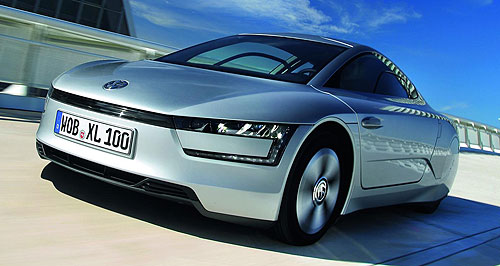Make / Model Search
Future models - Volkswagen - XL1Geneva show: VW to produce 0.9L/100km XL1Light fantastic: The Volkswagen XL1 weighs just 795kg and slices through the air with a record coefficient of drag for a production car of 0.189. Revolutionary super-frugal Volkswagen XL1 goes from concept to production realityGallery Click to see larger images 22 Feb 2013 VOLKSWAGEN has confirmed production of its super-efficient XL1 plug-in hybrid, which weighs just 795kg, sips 0.9 litres of fuel per 100 kilometres and emits a paltry 21 grams of CO2 per kilometre – record figures for a production car. Whether this revolutionary car will reach Australia following its world debut at the Geneva motor show next month is unclear, as Volkswagen Group Australia communications general manager Karl Gehling told GoAuto must “wait and see”, but conceded that the company would “look at it”. The sleek, low-slung two-seater also sets a production car record for its low coefficient of drag, rated at just 0.189, meaning it uses just 6.2kW to travel at 100km/h – and it can drive for up to 50km on electricity alone. Propulsion comes from a 35kW 800cc two-cylinder turbo-diesel engine combined with a 20kW electric motor powered by a lithium-ion battery, all driving through a seven-speed dual-clutch automatic transmission. Volkswagen claims the XL1 can hit 160km/h and accelerate from standstill to 100km/h in 12.7 seconds. British publication Autocar reports that Volkswagen is also working on a hybrid version of the Up city car that uses the XL1 drivetrain and is expected to consume around 1L/100km. At 3888mm long and 1682mm wide, the XL1 has a similar footprint to a VW Polo light car but being just 1153mm tall, it sits 129mm lower than the Porsche Boxster sportscar it will be built alongside in limited numbers at Onasbruck, Germany. Volkswagen has long strived to produce what it calls the one-litre car, revealing L1 concepts in 2002 and 2009, which both had the driver and passenger sitting in tandem like a Renault Twizy. In 2011 the XL1 concept was revealed at the Qatar motor show, closely previewing the production car, with driver and passenger sitting in slightly offset positions to improve interior space without harming aerodynamics. Official detailed specifications of the production XL1 have not been released but do not appear to have changed much from the 2011 concept. The concept used a pioneering and patented carbon-fibre body construction technique called Resin Transfer Moulding, meaning the shell tipped the scales at 230kg, while magnesium wheels, ceramic brake discs and aluminium suspension and steering components brought further weight savings. Interior components were also made from lightweight materials, with just 23.2 per cent of the entire car being made from steel or iron. The drivetrain and running gear respectively weighed just 227kg and 153kg. VW’s quest to put a one-litre car into production started in 2000 when Ferdinand Piech, now Volkswagen AG chairman of the supervisory board, said the company would work towards a practical car that could achieve the ambitious fuel consumption milestone. Also on the VW Geneva show stand will be the all-electric e-Golf, sporty diesel Golf GTD and Golf R Cabriolet and the diminutive Cross Up SUV, with all but the GTD ruled out for Australian sale.  Read more21st of February 2013  Geneva show: Details of VW e-Golf, GTD emergeFirst production all-electric VW Golf, most powerful diesel Golf set for Geneva26th of January 2011  Slippery hybrid VW sips just 0.9L/100kmPlug-in diesel Volkswagen XL1 concept pushes the barriers of fuel efficiencyAll future models Alfa Romeo Alfa Romeo Abarth Abarth Alpine Alpine Alpina Alpina Audi Audi Aston Martin Aston Martin BMW BMW Bentley Bentley Chery Chery Brabham Brabham Chrysler Chrysler Chevrolet Chevrolet Cupra Cupra Citroen Citroen DS DS Dodge Dodge Fiat Fiat Ferrari Ferrari Foton Foton Ford Ford Great Wall Great Wall FPV FPV Haval Haval GWM GWM Honda Honda Holden Holden Hummer Hummer HSV HSV Infiniti Infiniti Hyundai Hyundai Jaguar Jaguar Isuzu Isuzu Kia Kia Jeep Jeep Land Rover Land Rover Lamborghini Lamborghini Lexus Lexus LDV LDV Mahindra Mahindra Lotus Lotus Mazda Mazda Maserati Maserati Mercedes-AMG Mercedes-AMG McLaren McLaren MG MG Mercedes-Benz Mercedes-Benz Mitsubishi Mitsubishi Mini Mini Opel Opel Nissan Nissan Peugeot Peugeot Pagani Pagani Proton Proton Porsche Porsche Renault Renault Ram Ram Rover Rover Rolls-Royce Rolls-Royce Skoda Skoda Saab Saab SsangYong SsangYong Smart Smart Suzuki Suzuki Subaru Subaru Toyota Toyota Tesla Tesla Volvo VolvoMotor industry news |
Click to shareVolkswagen modelsResearch Volkswagen All future models Alfa Romeo Alfa Romeo Abarth Abarth Alpine Alpine Alpina Alpina Audi Audi Aston Martin Aston Martin BMW BMW Bentley Bentley Chery Chery Brabham Brabham Chrysler Chrysler Chevrolet Chevrolet Cupra Cupra Citroen Citroen DS DS Dodge Dodge Fiat Fiat Ferrari Ferrari Foton Foton Ford Ford Great Wall Great Wall FPV FPV Haval Haval GWM GWM Honda Honda Holden Holden Hummer Hummer HSV HSV Infiniti Infiniti Hyundai Hyundai Jaguar Jaguar Isuzu Isuzu Kia Kia Jeep Jeep Land Rover Land Rover Lamborghini Lamborghini Lexus Lexus LDV LDV Mahindra Mahindra Lotus Lotus Mazda Mazda Maserati Maserati Mercedes-AMG Mercedes-AMG McLaren McLaren MG MG Mercedes-Benz Mercedes-Benz Mitsubishi Mitsubishi Mini Mini Opel Opel Nissan Nissan Peugeot Peugeot Pagani Pagani Proton Proton Porsche Porsche Renault Renault Ram Ram Rover Rover Rolls-Royce Rolls-Royce Skoda Skoda Saab Saab SsangYong SsangYong Smart Smart Suzuki Suzuki Subaru Subaru Toyota Toyota Tesla Tesla Volvo VolvoMotor industry news |



































Facebook Twitter Instagram